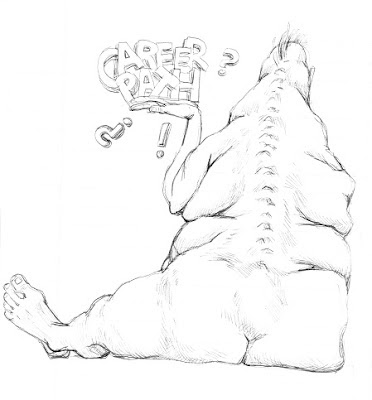Loud noises are coming from the basement under the Love Shack (the 1940s triplex I live in). A minute ago, the landlord George pounded on my door and cautioned me not to run the water into my kitchen sink, which has been well and truly clogged since last week (see previous rant). Now he is in the basement banging on the pipes. I'm hoping today he will be able to remove the clog, although I fear that it will take more than pipe-banging to do it.
The clog-busting endeavor began on Thursday. George interrupted my after-work nap. He's an middle-aged white-haired guy, but I imagine his work as a contractor keeps him fit. He looked pretty svelte in his loose faded jeans, old mud-colored wool sweater, and hiking boots. He hesitated a split second on the threshold, eyeing my carpet. Then he strode past me toward the kitchen. In that tiny moment he had discerned that I am house-keeping-challenged and walking on my rug with dirty boots would not be an issue.
He took command. First he ran water into the sink. Within seconds the sink was filling. We stood and watched as the water swirled around and came to a calm standstill. Nope, definitely not draining. He stabbed a plumber's helper over the drain and leaned into it, shooting water all over the kitchen. I stepped back. When he stopped, I moved back in, and we peered at the water. Still not draining.
"Do you have a bucket?" he asked me. I quickly provided a cheap blue bucket, which he placed under the drain. While I hovered nearby, George contorted his middle-aged body in front of the under-sink cabinet and began to unscrew the pipes under the drain. Water went in the bucket. Wow. What a pro.
He took apart the pipes. We were both hoping to see one easily-removable clog of cat hair, olive oil, and dirt, stuck in the curved part of the pipe. Well, I know I was. But no, the pipes were all clear. I could see his shoulders deflate a little.
He went out to his truck and brought in a coil of metal rope: a snake. On one end was a little whisk device, presumably intended to scrape the muck off the sides of the pipes. There was some kind of a sliding gizmo that he could tighten and untighten as he forced the metal rope into the hole in the wall. Donning rubberized gloves, he shoved the metal rope into the hole, twisting it with his hands, grunting with the effort. After a couple minutes, he took off his pullover sweater and handed it to me. "Now I see why plumbers get paid the big bucks," I said.
He worked the snake into the hole, but I could tell it was slow going. "I can't get it past the bend by the floor," he said. He didn't sound angry or frustrated. He sounded like a scientist working on a challenging experiment.
He yanked on the snake, bringing out blobs of gloppy brown muck. We contemplated the blobs. He poked at one with a screwdriver. "Looks like hair," he said. I thought of my constantly shedding cat and grimaced. "I try so hard to keep stuff out of the drain," I whined.
He went out the back door to the basement, leaving a pile of tools, the snake, and glops of goopy brown gook around the sink, the counter, and on my handwoven Ikea rag rug. After a couple minutes, I heard a loud ratchety sound. "Yay," I said to myself. "He's brought in the power tools." I hovered around the sink, waiting for a miracle. Suddenly the water rushed down the drain. Success!
I trotted down the steps to the basement to tell George the good news and saw that he had cut the drain pipe in half at about eye-level with a cordless chain saw device. Radical solution! There was a spray of water all over the cement wall, across the washer, and on George. That's one way to get the sink to drain, I thought. That would never have occurred to me.
He pulled off one section of the pipe and shone a light into the end. At first, I couldn't believe what I was seeing. Around the inside of the pipe was a one-inch layer of gloppy brown muck. Down the center of the entire three foot section of pipe was a tiny opening, maybe a half-inch across: the water channel. "Did I do that?" I asked in awe. George shook his head. "Fifty years of grease did that." Whew. I felt a little like an archaeologist looking at the remnants of a long-dead civilization. I bet they cooked with
lard, I thought with smug superiority. How primitive!
He didn't have the supplies to finish the job on Thursday. He replaced the pipes under my sink with lovely new white plastic tubes, but told me not to run much water, because the pipes in the basement were clogged and needed to be replaced. Yesterday I became ultra conscious of how much water I use. I toted dirty dish water and vegetable rinse water in my little blue bucket the fifteen steps from the kitchen to the bathtub, and thought about people who walked miles carrying their drinking water back to their villages. My little personal plumbing problem pales in comparison.
At a little after noon today I went to a meeting and when I returned, George was gone. My drain is now unclogged. The secret life of plumbing is once again hidden from view. Life goes on. I washed some carrots for my salad, thinking that the next fifty years of cat hair, olive oil, and carrot shavings begins today, something for the next tenant to contemplate when I'm long gone.



















